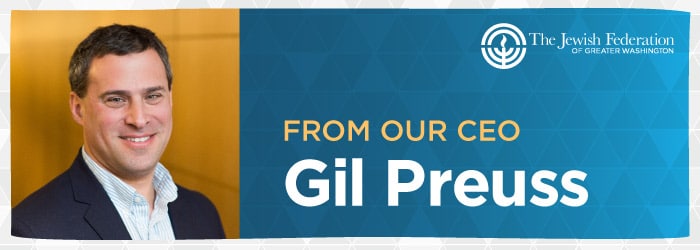-
12 April 2019

Passover is one of my favorite Jewish holidays.
Part of the power of Passover—apart from the warm embrace of matzo ball soup and that divine brisket—is its timeless relevance. In recounting the story of Passover, we are reminded of the universal values of freedom, self-determination, justice, and empathy. Woven into the Haggadah are striking allegories for the times in which we live today.
But there is another reason Passover has continued to serve as a central touch point in modern Jewish life, and that is because it is the story of our people. We are drawn to the Passover story not just for its metaphors but for its specifics. Throughout the Seder, we revisit the ins-and-outs of the story and, in doing so, help to reinforce our connection to Jewish history and tradition.
Indeed, Passover is a perfect example of the importance of Jewish learning. By looking closely at our past, asking questions, engaging in debate, and examining the reasons behind Jewish ritual, we grow as Jews and as people.
To start, Jewish knowledge adds meaning and depth to Jewish practice. Open one of the 5,422 pages of the Talmud and you will find explanations, arguments, translations, and many, many questions. In the Jewish tradition, wisdom is not the sole purview of those on high. Rather, the full breadth and depth of Jewish religion and philosophy belongs to us all. It is ours to explore, to wonder about, and to adapt. It is ours to use to deepen our understanding of who we are and what we do. It helps us grow as people looking to lead meaningful lives.
Jewish learning is inherently instructive. By diving into Jewish thought, we uncover valuable lessons in how to navigate a complex and modern world with wisdom and grace.
Consider, for instance, the teachings of 20th century American Rabbi Joseph Soloveitchik. The rabbi had observed a small text change throughout the years when it came to the laws of Passover.
In the Mishnah, we are told: “In every generation, a person is obligated to see themselves as though they came forth from Egypt.” (Pesachim 10:5, emphasis is mine.) Later, in the 12th century, the famed Rabbi Moses Maimonides made a slight edit to this rule. He taught: “In every generation, a person is obligated to show themselves as though they came forth from Egypt.”
Rabbi Soloveitchik did not let this change go unnoticed. He pointed out the shift from the passive, reflexive verb “to see themselves” to the active verb “to show themselves” as highly significant. Originally, a Jew would need only internalize the Passover story for themselves. Maimonides, however, took the obligation one step further, imploring Jews to behave in a way that spoke to their deliverance from bondage.
What would it mean to demonstrate liberty? What actions are we compelled to take to help others find the same freedoms? What does this mean for us as American Jews? These are the kinds of forward-thinking questions that our ancient texts ask of us.
As we approach Passover, I invite you all to think about how this year can be different from all other years. What new questions would you ask? What new conversations should we have? It is through our collective questions and conversations that we can build an even more meaningful and inclusive community with Jewish learning opportunities for all.
Wishing you a happy and insightful Passover,
Gil
